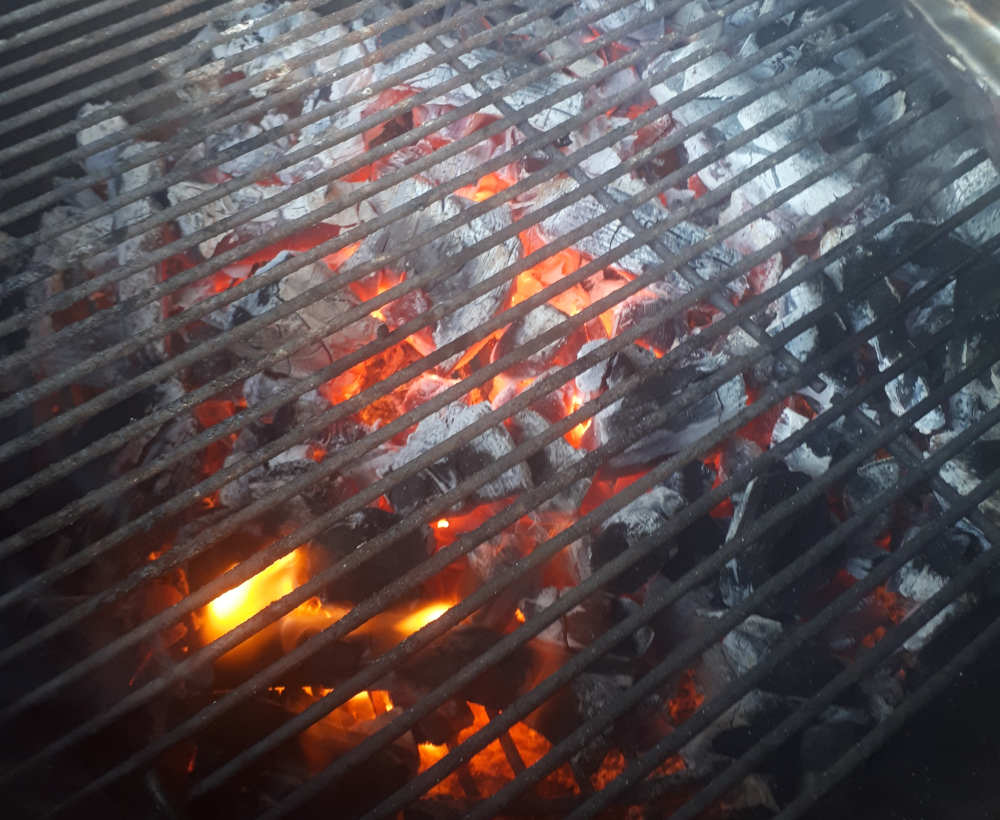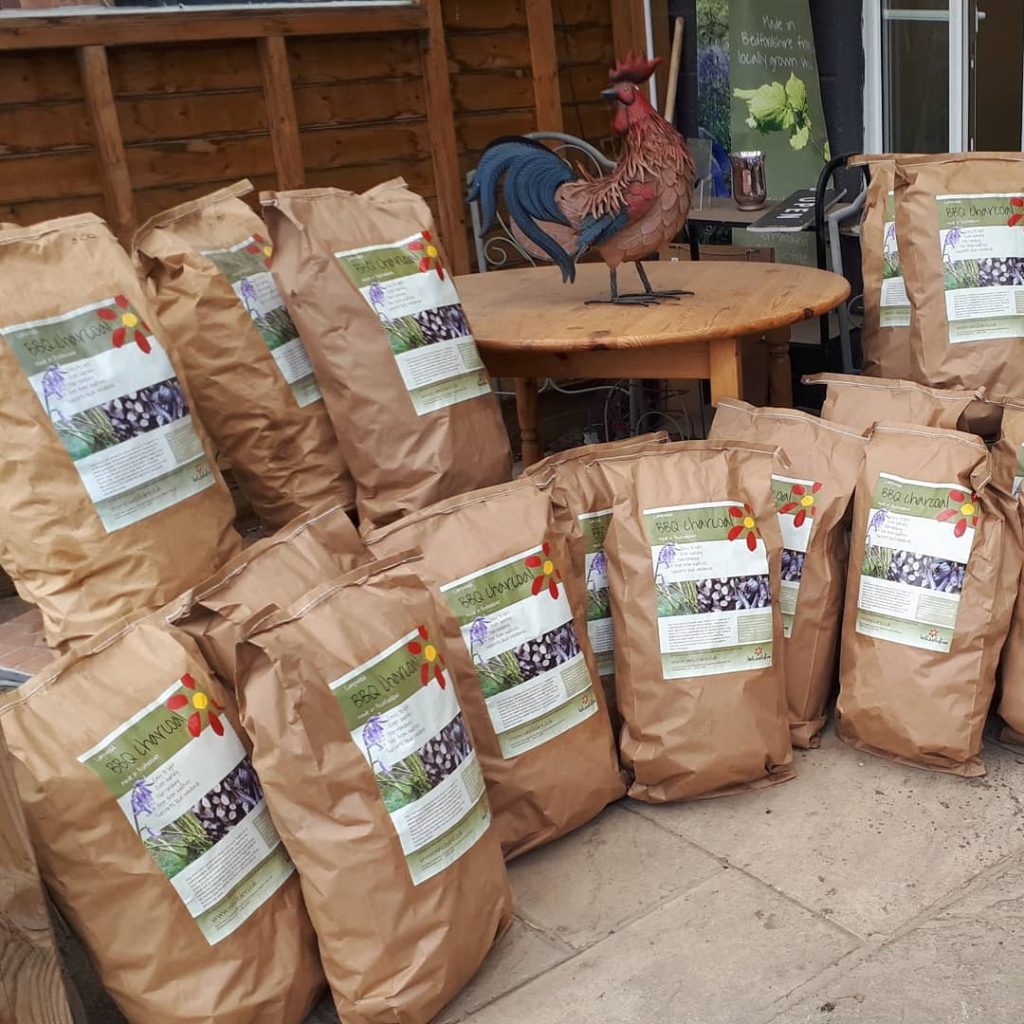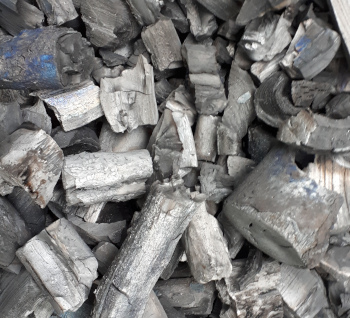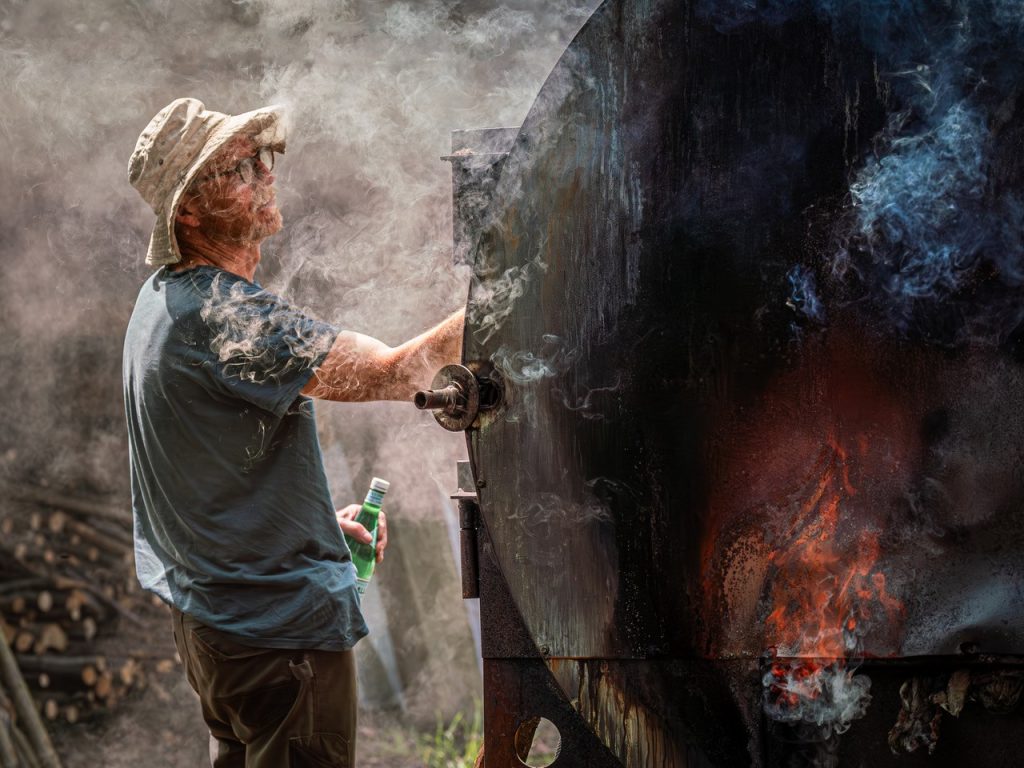Wassledine’s lumpwood barbeque charcoal

If you are looking for a high quality, Bedfordshire, UK-produced barbeque charcoal over which to cook, you’ve come to the right place. We reckon our charcoal can compete with the very best available, being made mostly from well-seasoned hardwoods like hazel, ash, oak, hawthorn and blackthorn, all grown in Bedfordshire woodlands.
We add nothing to it because it’s already easy to light, burns clean and hot for a good long time, without smoke (until your food starts to drip… As soon as you open the bag the quality is obvious – just bits of tree with everything but the carbon removed. We now use a retort to ensure that our charcoal is of the highest quality and your cooking experience is second to none (see below for information about the retort process).
We started producing small quantities of lumpwood charcoal in 2016, from old hazel, cut in both Bottoms’ Corner, Gravenhurst and Centenary Wood, Pulloxhill, Beds. The wood we were using was not straight enough for most other uses. We thought charcoal would be a sensible way to make use of it and were impressed with the quality of the charcoal we produced, so decided to go into production in a small way.
An unsolicited testimonial… “Used your charcoal at the weekend. Cleaned out old charcoal and started from fresh. It was really quick to light with hardly any smoke. Got up to temperature in about half the time it normally takes. Temperature was easy to control and consistent throughout. More than impressed. Thanks.” Mark, Cambridge
Lighting
You shouldn’t need to use fire lighters, so there’s no danger of tainting your lovely food with noxious stuff. Try this way to get the barbie going – wrap a couple of good handfuls in 3 sheets of dry newspaper and set in your barbeque. Light this and leave it for a couple of minutes. Once things are definitely happening, add more charcoal and leave it alone – go do something else, have a beer, water some plants, look at a tree; it should be ready to cook on in about 20 minutes.
Prices, quantities and how to get hold of some

Bags of charcoal cost £8.50, collected from us in Gravenhurst.
We put our charcoal in a bag of standard volume that when full, weighs a bit more than 3kg. However, we don’t sell it by weight as its weight varies and we reckon our customers would like a bag that’s full rather than one that weighs exactly 3kg.
Our charcoal is now stocked by the following excellent outlets in Bedfordshire:
Bowles Garage, Shillington
Disco-licious Farm Shop, Ion Bridge Farm, Lower Gravenhurst
The Forest Centre, Marston Moretaine
Franklin’s Farm Shop, near Sandy
Charcoal is usually available for collection direct from us by appointment or we can deliver to neighbouring villages for free (minimum order, 2 bags for delivery); please contact us to find out more.
Charcoal and the environment (a bit of a rant…)

Apart from the culinary advantages offered by British charcoal, the other great thing about it is that by buying our charcoal (or that made by most other British producers), you are supporting small businesses that actively manage woodland, most likely, like us, by coppicing – more information about our woods and coppicing here .
If these small coppicing businesses thrive, species that are well suited to coppiced woodlands, such as bluebells, primroses, wood anemones, willow warblers, nightingales, dormice, etc. get a chance to thrive also.
And finally… ..if you buy locally produced charcoal, you are reducing the road miles and fuel required to get the stuff into your barbeque, compared particularly with imported charcoal.
No, really finally this time… ..if it doesn’t say “British made” on the packaging, it almost certainly isn’t British. A lot of imported charcoal is still made from wood cut in pristine forest and mangrove swamps in tropical regions – its production is involved in destruction of habitats that had supported some of the world’s most endangered species. And that seems like madness to us.
Ok rant over.
How we make charcoal
When first we started researching the subject, we knew that kilns weren’t the way we wanted to go; they are, in our opinion, hard work, dirty, inefficient, dirty, polluting… and did I say dirty?
In January 2018 we ordered a Hookway retort from ex-artist and charcoal obsessive, James Hookway. Compared to making charcoal in a ring kiln a retort is amazingly clean and efficient. It converts all the initial charge of wood into char using only small waste wood to fuel the process. We had some problems with the Hookway and because of its small production volume we had trouble keeping up with demand. In early 2021, we acquired a second hand Exeter Retort, which is bigger and produces much more charcoal in one burn. It has been a difficult process to get it running but it has allowed us to expand production. We intend to expand further in 2024.

A retort is a decidedly cunning method of charcoal production. The wood to be charred is sealed into a vessel and heated by burning small diameter waste wood.
Image – Kevin Freeman Photography
The temperature rises, driving off all the water from the wood and eventually to a point, around 300-400 degrees Celsius, where the wood releases ‘wood gas’ a mixture of volatile compounds that burn at high temperatures – a process known as gasification or pyrolysis. These gases are vented into the combustion chamber and fuel the remaining phase of the charring process, so it requires no further wood fuel. The whole process in the Exeter Retort takes about eight to nine hours. Clever stuff.
Retort charcoal
The retort certainly produces amazing charcoal. Good quality charcoal has a very high carbon content and that comes from an efficient charring process. High quality charcoal is light and has a quite extraordinary ring to it when it’s tapped or poured onto your bar-be-que stove. Lesser quality charcoal may not have been fully charred so can still contain some of those compounds that will smoke and smell in the cooking process. Poorer quality charcoal is heavier so tends to be sold by weight. We have heard that charcoal briquettes are sometimes made with the addition of cheap minerals to bulk them out. This makes them heavy and leaves a strange non-ashy residue after burning.
Here’s a 3 1/2 minute video showing the Hookway process in action
